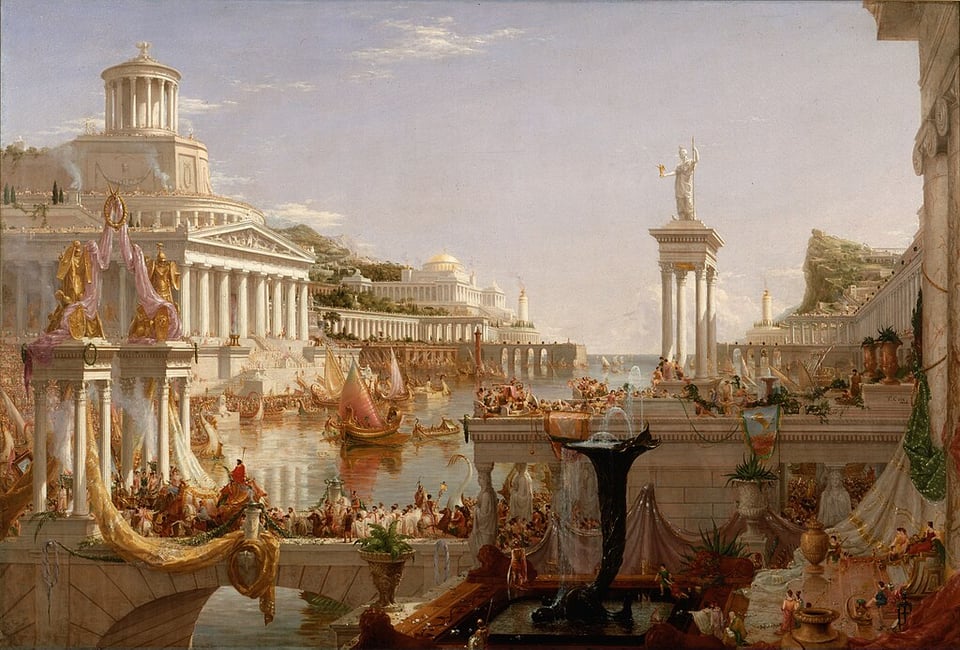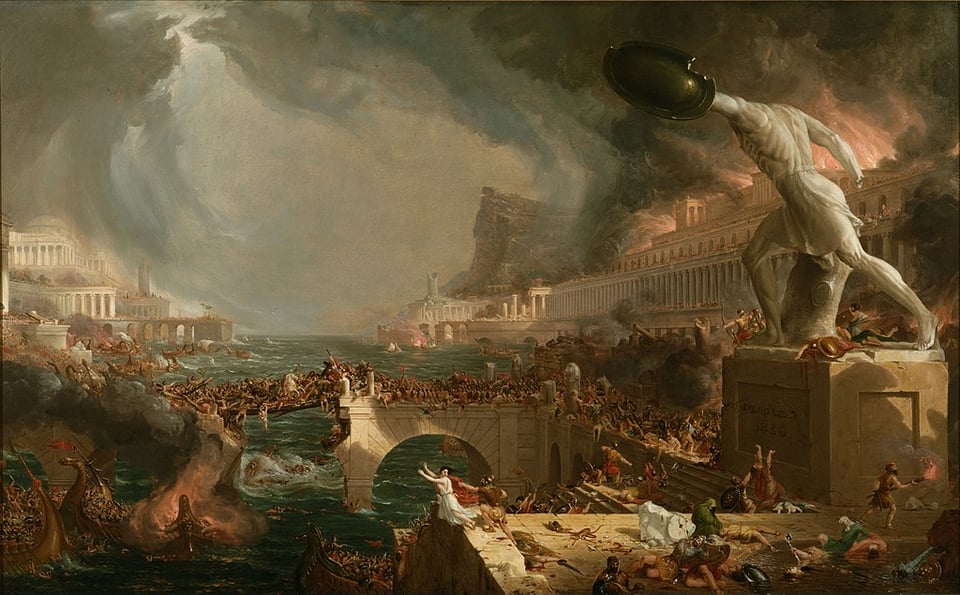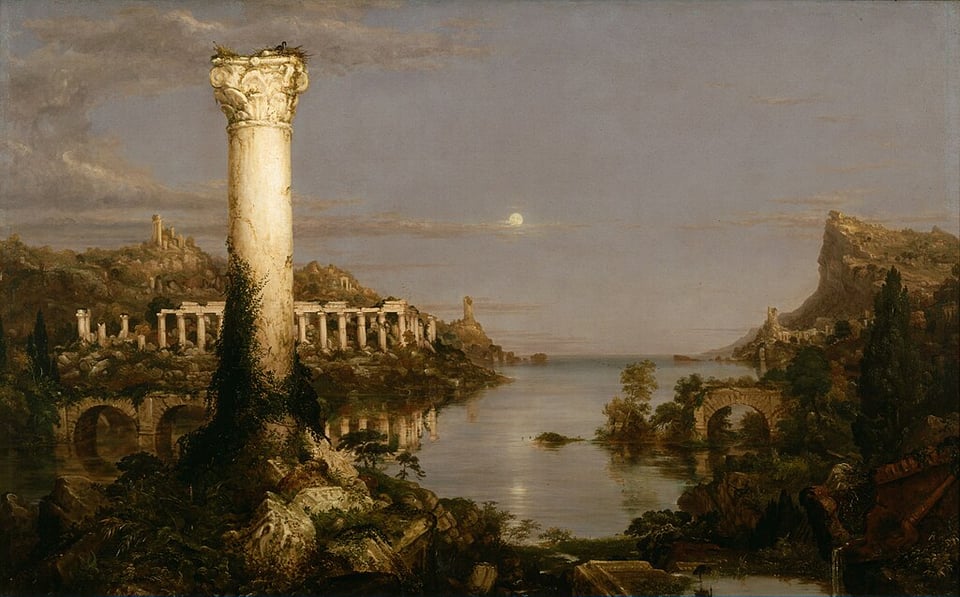The Decline and the Fall

Note to subscribers:
Talia has another big book deadline and is also dealing with some creeping burnout, so for the next while the Tuesday columns will be every other week; some respite from a thrice-weekly schedule may be just what is needed. Feel free to reply to this email if you have suggestions on a schedule you’d like to see, and what kind of content would best whet your appetite.

“In the second century of the Christian Æra, the empire of Rome comprehended the fairest part of the earth, and the most civilized portion of mankind. The frontiers of that extensive monarchy were guarded by ancient renown and disciplined valor,” opens Edward Gibbon’s storied 1782 multivolume History of the Decline and Fall of the Roman Empire. “Their peaceful inhabitants enjoyed and abused the advantages of wealth and luxury. The image of a free constitution was preserved with decent reverence: the Roman senate appeared to possess the sovereign authority, and devolved on the emperors all the executive powers of government.”
Of course, over a long time, and then all at once, everything went to shit. This is what you know if you know about Rome, even a little. Which is where I’m sitting, in the know-nothing section of the Coliseum: I have a hazy image of people eating enough to warrant a vomitoria, of opulent marble baths with cold and hot chambers, of the assassination of Caesar on the Ides of March, of Nero’s fiddle, and Caligula’s ennobled horse. There were so many who enjoyed and abused luxury, as Gibbon puts it. And so many more who never enjoyed it at all.
That thousand-year empire was full of slaves and crucified thieves and conquered peoples. It had good roads and fish sauce and produced the erotic poetry of Catullus. And it died. Left us arches, aqueducts, cisterns, place names (and other place names named after those places, like Syracuse, New York), the Latin language for naming butterflies and practicing law, and the calendar we use to mark our days. Once they had a Senate, and elections. Then they didn’t, and had a bunch of emperors, some crazy, and some not, and a lot of whom stabbed one another. At some point, about a thousand years after the city of Rome was founded by two boys who drank a lot of wolf milk, they all died out in a lather of lead poisoning and barbarians, or possibly became Italians.
One of the big memes last year involved girls asking their boyfriends "How often do you think about the Roman Empire?" It was some weird gender-defining thing: boys are supposed to think about the Roman Empire a lot while girls think about, I don’t know, periods and glitter? Less serious things? But lately I’ve been thinking about the Roman Empire.
Not in any serious way. My editor David, who quite seriously suggested I read Suetonius for this column when I was busy complaining about burnout, will probably have a conniption fit about the above paragraphs. I’m leaving space for an editor’s note here. At any rate.
Ed. Note: First, yes, I do probably think about the Roman Empire every day; for years, I had an antique map of the city hanging in my living room, so it was hard to avoid. But I’ve never studied ancient history in any academic setting—I’m just a nerdy autodidact with an insatiable need to know everything that ever happened. Thankfully for our purposes here, I am sufficiently conversant on the subject to clean up some of the mess that Talia just made. Speaking of which: a "vomitorium" has nothing to do with emesis; it was the tunnel through which Roman spectators exited the Colosseum and other amphitheaters and stadia. And, sorry, but Syracuse was a Greek city—Corinthian, no less—although upstate New York also has towns named for Cicero, Pompey, Brutus, Cato, and Ovid, so Talia’s intention was pure. Still, she should read Suetonius. Everyone should.—David
It’s just this thing where I wonder where the pomp of empire stopped, and where the decline came in, and how you could tell, if you were the average prole slinging olives in a Roman market, or even the average praetor in a palace. I’m wondering what it was like, in those cusp moments: the moment the Republic gave way to the Empire, the way the Empire gave way, buckled under, turned to remnants and stone. When did the sound of their trumpets stop, the purple togas get put away, the mint stop rolling out imperial-stamped coins? Could you tell? Would you have known, if you were a girl getting married off, if you were an old slave getting auctioned off, if you were a merchant selling fragrant oils, if you were a scribe? In Crimea, in Tunisia, in Palestine? Could you look over your shoulder and pinpoint the day the Senate became a relic. Could you note, precisely, when the Visigoths and the Vandals took over everything, and Rome ended?

This is a foolish question because some of it is readily answered (I am certain there are numerous dissertations on some of the above) and some of it is unanswerable (most people were illiterate in the Roman Empire because so many were enslaved, women, or both) and some of it is just me dreamily trying to slide into a long-ago time when, as Plutarch chronicles, a lot more people were stabbed on triremes. (Of Pompey, Plutarch writes in The Fall of the Roman Republic: “Dead men don’t bite.”) Still.
Still–the New Hampshire primary is today, and never has it felt more like the futile pageantry of something that knows it’s dying. Meatball Ron dropped out after wrecking a whole state because he loves being cruel, but also to get the love of the Republican Party. He failed, and the rest of the field, with their minuscule percentages, feel like ravens over the carcass of a great beast squawking for attention. That’s why I’m thinking about all this. I’m wondering, fishwife that I am, little scribe that I am, what do I know? What would I have known then?
Somewhere midway through Gibbon’s first volume, in the slide of decline under the emperor Commodus: “The people quitted their favorite amusements for the more delicious pleasure of revenge, rushed in crowds towards a palace in the suburbs, one of the emperor’s retirements, and demanded, with angry clamors, the head of the public enemy.”
Angry clamors and the delicious pleasure of revenge…
There's something rumbling under all the glossy marble, under the neoclassical architecture of the capital we built to ape those very Caesars. Something all ours, though, more Caesars Palace than Caesar’s palace, gilt and gleam and a big howling void underneath. Living in the decline of an empire feels itchy along the spine, it’s like living in a gaseous cloud of a predator’s breath, doing business among the rotting teeth of the beast… and less and less business, and more and more beast. It is like living in a hole in a rotten tooth; rankness becomes just air after a time; you can get used to anything.
The Sword and the Sandwich is a newsletter about deadly serious extremism and serious sandwiches. Please consider supporting this work with a paid subscription.
Gibbon again, of the subjects of Theodosius: “A long period of calamity or decay must have checked the industry, and diminished the wealth, of the people; and their profuse luxury must have been the result of that indolent despair which enjoys the present hour and declines the thoughts of futurity.”
Ed. Note: When Talia suggested writing about the fall of Rome, I had to ask: “Which one? The Republic? Or the Empire?” As Mary Beard has noted, "the empire created the emperors—not the other way round." In other words, the Empire rose long before the the Republic fell—an event which arguably took place around 130 BC, with the rise of the brothers Gracchi. Unless it fell a few decades later, when Marius held onto the consul’s office for an unheard of seven-consecutive terms. Or in 49 BC, with the crossing of the Rubicon and the dictatorship of Julius Caesar. Or perhaps in 27 BC, with the accession of Caesar's heir, Octavian, as Augustus, the first emperor.
As for the fall of the Empire itself, take your pick: Gibbon puts it as early as the rise of Caesar, and as late at 1590 AD, when his history comes to a close, though the conversion of Constantine 312 AD and the triumph of Christianity are deemed the primary culprits. In Hollywood’s adaptation of his work, meanwhile, blame is placed at the feet of Commodus, who took the purple in 180 AD (Christopher Plummer plays him in the movie, a role Joaquin Phoenix would later reprise in
Gladiator"). Personally, I favor 406 AD, when the Rhine froze over, rendering the Empire’s northern line of defense utterly useless; within a decade the barbarians had sacked Rome. All of which is to say that pinpointing the fall of Rome depends on what you mean by Rome.This is why it’s so tricky trying to draw comparisons between Rome’s fall and our own precarious moment in history. To many on the left, faced with the prospect of a would be-tyrant set to dismantle the republic, it’s the first century BC. To those on the right, it’s the fifth century AD, and the foreign "invasion" has already begun. But most everyone seems to agree that din of calamity and the stench of decay are already in the air.—David

Profuse luxury; indolent despair; diminished wealth… my whole body thrums with a tune that might be this same song, in a lesser key, on a shoddy electric keyboard in a lounge somewhere; and Clio the Muse of History gone all blowsy and raddled, her scroll turned into a dinged-up smartphone, her hair done up and then let go, prostrate now, presiding over nothing; so little, so gaudy are the scraps of empire. What, to the fishwife, is an empire? It’s roads and laws and soldiers; and when the roads crack and the laws break and the soldiers stop marching, it’s the end of the song, it’s done, time to gather in the nets.
These are the things I think about when I should be reading Suetonius, or Mary Beard, or a life of Sulla. I think about the fishwife at the verge of the great collapse, and after. I think about her, gutting and drying, making garum for the praetors, making minced-fish minuta for the Visigoth palate, learning Latin letters, learning Gothic runes, or more likely learning none at all… And is it better, after all, to be Plutarch, who knows what has been lost and chronicles it, or the fishwife, whose name will never be known, who gets on with things as they come? Is it better to look into the sagged red wet mouth of decay or look away? Who are the people clamoring, angry? Where are they going, and where will they go? Will revenge, when it comes, if it comes, be a delicious pleasure, or just another scrap of rot to choke down? Who can hear, over the loud wild wind of an era’s end, the breathing of the great and dying beast?

Add a comment: